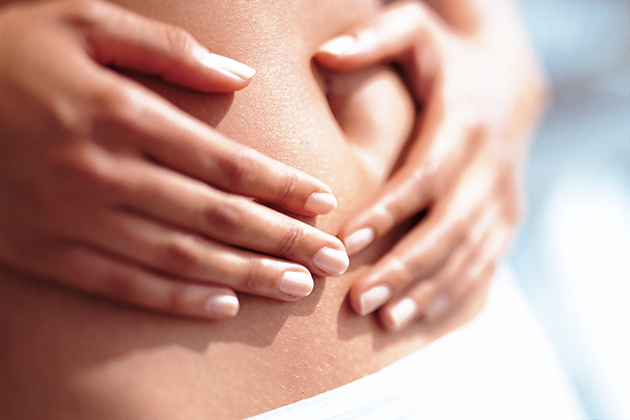
Photo: Getty Images
Bloating is uncomfortable. It’s also complicated, because there’s no one thing that causes it. You could be bloated for a number of reasons. Maybe it’s because you’re lactose intolerant and ate a dairy product, or because you spent the last four hours chewing gum and accidentally swallowed too much air, or even because you went a little too hard on some salty food — seriously, this list goes on for a while.
“Bloating has become a bit of a slang word,” Lisa Ganjhu, D.O., gastroenterologist and clinical associate professor of medicine at NYU Langone Medical Center, tells SELF. She explains that “in the gastrointestinal world, bloating is just a lot of trapped gas in your stomach, small bowel, or colon.” What we commonly know as bloating may also be your body retaining water, which David Greenwald, M.D., director of clinical gastroenterology and endoscopy at Mount Sinai Hospital, says can often be a side effect of a high-sodium diet.
Before you look for a cure to your bloat, Greenwald says it’s important to understand what’s causing it. This will enable you to choose the right solution and alleviate that unwanted swell as quickly as possible. Generally, when you’re bloated, you’ll want to stay away from foods that are difficult to digest, like cruciferous or brassica vegetables (AKA broccoli, Brussels sprouts, cabbage), as those are loaded with indigestible sugars. You’ll also want to avoid eating too much fiber, which can itself produce more gas and bloating, and if you’re lactose-intolerant, it’s best to ditch that dairy entirely. Instead, opt for one of these three different types of foods that will sate your hunger and help release the pressure.
If you’re retaining water, seek out foods with lots of potassium.
Potassium is an electrolyte that keeps fluid levels in the body regular. The nutrient is an essential part of a well-rounded diet, and overall you should be trying to get a certain amount of potassium every day — the recommend daily intake (RDI) is 4,700 mg. If you’re experiencing bloat from fluid retention — which may be caused by a high-sodium diet — Greenwald says that upping your potassium intake will help decrease that swollen feeling. These 10 foods are packed with that debloating agent:
Swiss chard
Bananas
Baked potatoes
Sweet potatoes
Acorn squash
Spinach
Salmon
Edamame
Halibut
Coconut water
See More: 8 Sneaky Ways To Debloat In Just One Day
If you’re fighting gas, try these foods that will relax your gastrointestinal tract.
If you think your bloat may be caused by trapped gas, Ganjhu says you’ll want to relax your gastrointestinal (GI) tract with one of these six foods. Papaya is full of an enzyme called papain, which is known to aid digestion. Mint, licorice, fennel, caraway, and ginger all have antispasmodic properties and oils which can help soothe your GI tract and push digestion along.
Papaya
Mint
Licorice
Fennel seeds
Caraway seeds
Ginger
See More: These 9 Foods Are Packed With A Secret Bloat-Busting Nutrient
And if you really need to eat even though you’re feeling all puffed up, opt for fruits and vegetables that are easy to digest and full of water.
The thing with bloating, Greenwald explains, is that it will resolve itself over a period of time. Of course, during this time, you can’t avoid eating because you’re feeling uncomfortable — that bloat could last all day long! Instead, he says to opt for fruits and vegetables that are easy to digest and won’t cause any additional bloating. These five foods fit into the easy to digest category, and they’re also full of fluids. Flooding your body with fluids will help your body release any of those fluids it may be holding onto, which can be a great solution if you feel your bloat is caused by fluid retention.
Cantaloupe
Cucumbers
Celery
Pineapple
Grapes
See More: 6 Reasons You Magically Gained Weight Overnight
This article originally appeared on SELF.
